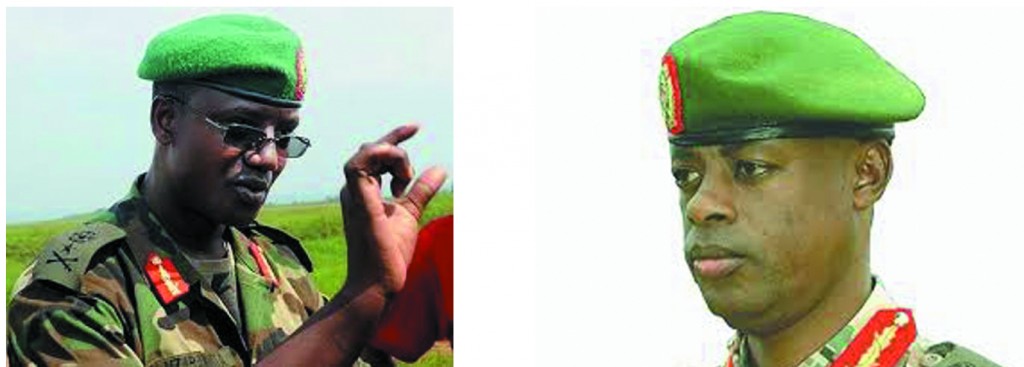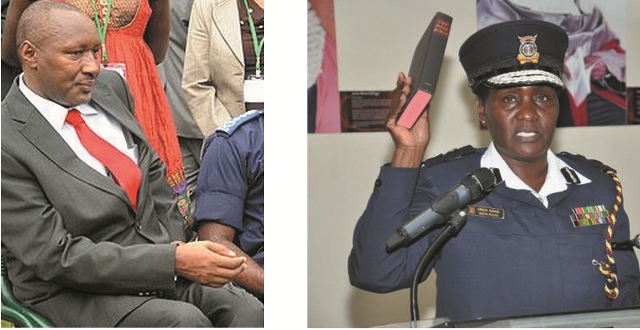…Meanwhile From Mombasa, Kenya, Interpol Calls for Heightened Regional Police Co-operation.

Rwanda’s Defence Force (RDF) Spokesman General Joseph Nzabamwita (L). with Rwanda’s Defence Minister General James Kabarebe (R).
Ten East African nations have pledged to contribute three motorized battalions, one mechanised battalion, one light infantry battalion and three squadrons/companies of 850 men each towards the setting up of the Eastern Africa Standby Force (EASF) which is set to become operational by December, [2014] under the auspices of the African Union (AU).
The concept of a regional force to promote peace and security emerged in 2004 and was originally planned to be operational in December 2015 but countries in the region pushed this forward in light of the numerous security challenges at present.
A resolution providing for the establishment of the long-delayed regional rapid reaction force was adopted by regional heads of state, defence ministers and military chiefs at a meeting held in the Rwandan capital Kigali the week that ended on August 23, 2014. Rwanda currently chairs the Council of Ministers of Defence and Security of Eastern Africa and the Committee of Eastern Africa of Chiefs of Defence Staff.
A report in the military affairs Defence Web says Rwanda Defence Force (RDF) spokesman General Joseph Nzabamwita told the Rwandan daily New Times that the ten East African member countries have already pledged significant troop and material contributions to make the force a reality. Tanzania is not mentioned in the report.
“The East African standby force heads of state decided that due to the insecurity that is prevailing in the East African region the member countries need to take urgent steps. Burundi has pledged to contribute one battalion of light infantry and we are also getting three motorised battalions – one each from Uganda, Ethiopia and Rwanda – and one mechanised battalion from Kenya.
“Comoros, Djibouti and Somalia are each contributing a squadron or company. All these battalions have their integral equipment and they have a strength of at least 850 servicemen each. Other than these five countries that contributed fully equipped military battalions, we also have others which made significant logistical and material contributions,” Nzabamwita said.
The regional defence, intelligence and security services chiefs from Burundi, Comoros, Djibouti, Ethiopia, Kenya, Rwanda, Seychelles, Somalia, Sudan and Uganda who met in Kigali also agreed that each country would contribute four special police units of between 140 and 170 officers each to support the civilian peacekeeping component during active deployments. Other combat support services pledged include two hospitals, combat engineers and special forces.
“From the pledges made, we got all the troops and the police officers we needed to put at the disposal of the force to enable it to do rapid deployments, at any time,” Nzambamwita said. The EASF will not be based in one particular country as every country will host and sustain its own contingent and deploy it when required.
The force will become the regional African Union crisis response force with powers to intervene in regional conflicts to protect civilians, prevent loss of life and contain a myriad of regional armed insurgencies.
Addressing the regional military commanders in Kigali, Rwandan defence minister General James Kabarebe said the region should not wait for donors but quickly fund the initiative because it is lagging far behind the rest of Africa in terms of meeting the AU security council goal of having a peacekeeping force of 5 000 per regional bloc by December 2014.
“Once we have the funding, then we are assured of sustainability. The most important thing is that the leaders are planning to ensure that member states contribute and that applies to donors too. So we can only hope that we will get all the diplomatic support and funding to get this force ready as soon as possible,” Nzambamwita said.
In terms of the EASF protocol, all member states are required to contribute to a fund which will be used to set up and equip a regional force with the capacity to deploy to conflict and crisis areas within 14 days.
Meanwhile in Mombasa, Kenya on Monday, August 25, 2014, the International Police organization (Interpol) warned of new security threats by organized criminal gangs including terrorist militants which have caused instability in the Eastern Africa Region.

Head of Interpol Eastern Africa Regional Bureau, Rwego Francis (L) with Kenya’s Deputy Inspector General of Police Grace Kaindi
Head of Interpol regional Bureau for Eastern Africa, Rwego Francis, said the organized gangs have become more sophisticated with advanced technology, hence need for concerted efforts among countries.
“All crimes have become transnational, so fighting crime without a regional approach will not assist us. We need to strengthen cooperation in carrying out simultaneous operation.” Rwego told the East African Police Chiefs Association Annual Conference in Mombasa.
He said Al-Shabaab continue to pose a threat to the region. Rwego said cybercrime is widely assisting in funding the group’s activities in the region, hence the need to improve counter terrorism efforts. The establishment of Financial Intelligence Units (FIU) in every country will assist in tracking their funding, he said, adding that effort was needed to enhance counter terrorism efforts to deal with terrorism threats.
The East African Interpol Bureau Chief also called for a regional approach that requires timely sharing of information, joint investigation and capacity building among members’ nations. The week-long meeting is attended by police chiefs from Burundi, Djibouti, Ethiopia, Rwanda, Somalia, Sudan, Uganda, Comoros, Eritrea, Seychelles, South Sudan and Tanzania.
The meeting has been convened to map out ways of combating serious crimes that involve networks across countries. Rwego challenged the participants in the meeting to come up with appropriate recommendations which will serve to make policing in the region more effective.
Kenya’s Deputy Inspector of Police Grace Kaindi said terrorism constitutes a serious threat to international peace and security. “It is our duty as security agencies to collectively fight terrorism as a priority crime area. This can only be done by strengthening our capacities through enhanced cooperation and collaboration at the borders,” Kaindi said.
She said there is need to establish command posts at entry and exit points to enable screening of passport and travel documents, adding that countries should also update national and international data bases that will play major role in screening criminal elements. The meeting will also deliberate on threats posed by drug and human trafficking that has been on the rise in the Eastern Africa region.
“Our borders have been easy target for drug traffickers who have been able to compromise various sectors within our region. The implication is severe with criminal gangs fueling corruption and hurting legitimate economy,” Kaindi said.
The police commanders and heads of criminal investigations from 17 countries are expected to share vital information on poachers that has been on the rise in the region.



